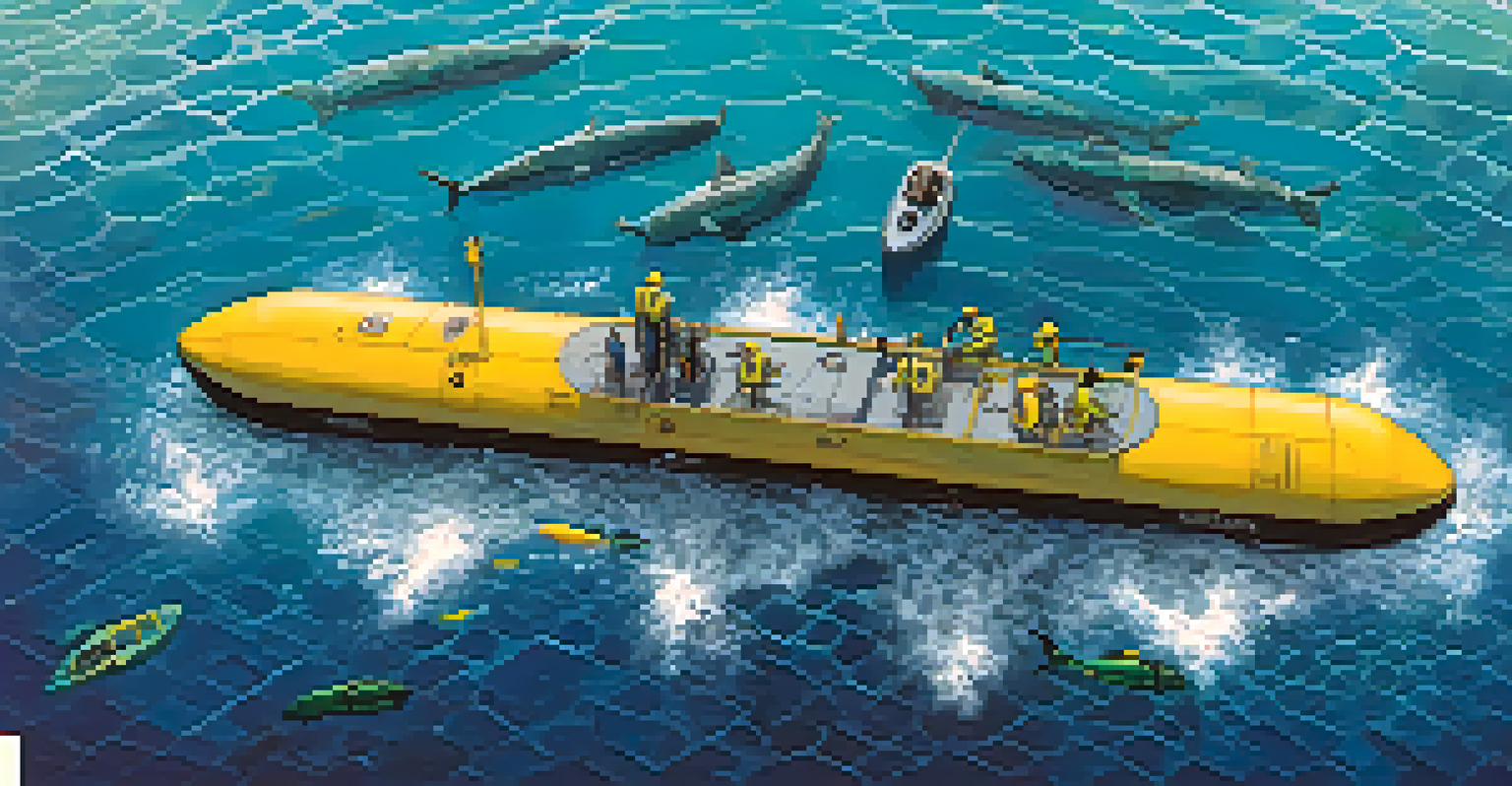The Role of Scripps Institution in Oceanography and Space

Introduction to Scripps Institution of Oceanography
The Scripps Institution of Oceanography, part of the University of California, San Diego, is a cornerstone of ocean and earth sciences. Established in 1903, it has a rich history of groundbreaking research that shapes our understanding of the ocean and its interactions with the atmosphere and climate. With a mission to explore and understand the oceans, Scripps plays a pivotal role not only in marine science but also in broader planetary studies.
We cannot solve our problems with the same thinking we used when we created them.
Scripps is renowned for its interdisciplinary approach, combining oceanography, biology, chemistry, and geology. This collaboration allows researchers to tackle complex environmental issues, such as climate change and biodiversity loss. The institution’s work is critical in providing the scientific data needed to inform policies and conservation efforts worldwide.
In addition to its research contributions, Scripps also emphasizes education and outreach. By training the next generation of scientists and engaging the public in ocean science, Scripps fosters awareness and appreciation for the oceans, ensuring that future generations recognize their importance.
Significant Research Contributions in Oceanography
Scripps has made remarkable contributions to various fields within oceanography. One of its notable achievements is the development of oceanographic instrumentation, which has revolutionized how scientists collect and analyze ocean data. These innovations enable researchers to monitor ocean conditions more accurately and understand their implications for global climate.

The research conducted at Scripps has led to significant discoveries, such as the identification of ocean currents and their effects on climate patterns. For example, studies on the El Niño phenomenon have provided critical insights into how changing ocean temperatures can impact weather systems worldwide. This knowledge is vital for predicting severe weather events and preparing for their consequences.
Pioneering Ocean Research Since 1903
Scripps Institution of Oceanography has played a crucial role in advancing our understanding of ocean and earth sciences through innovative research and interdisciplinary collaboration.
Furthermore, Scripps scientists are at the forefront of marine biodiversity studies, assessing the health of marine ecosystems. Their research informs conservation strategies aimed at protecting endangered species and habitats, underscoring the institution's commitment to sustainable ocean stewardship.
The Intersection of Oceanography and Space Research
Interestingly, the work at Scripps Institution also intersects with space research. Understanding the oceans is crucial for comprehending Earth's climate system, which is a significant focus for space scientists. For instance, data collected from ocean studies can inform satellite missions that monitor global climate changes from space.
The ocean stirs the heart, inspires the imagination, and brings eternal joy to the soul.
Moreover, the technology developed for oceanographic research often finds applications in space exploration. Techniques used for studying ocean currents and temperatures can be adapted for analyzing planetary atmospheres and surface conditions on other celestial bodies. This cross-disciplinary approach enriches both oceanography and space science.
Additionally, Scripps collaborates with organizations like NASA, sharing expertise and resources to enhance our understanding of Earth and beyond. This partnership exemplifies how oceanic research contributes to larger scientific questions regarding climate change and the potential for life on other planets.
Innovative Technologies and Ocean Monitoring
At the heart of Scripps' research are innovative technologies designed for ocean monitoring. Autonomous underwater vehicles (AUVs) and buoys equipped with advanced sensors collect real-time data on ocean conditions. These tools allow scientists to gather information from hard-to-reach areas, enhancing our understanding of ocean dynamics.
One of the key innovations is the deployment of robotic platforms that can operate for extended periods. These robots can gather data on water temperature, salinity, and even microbial life, providing invaluable insights into the ocean's health. This data is essential for researchers to track changes over time and assess the impact of human activities on marine environments.
Innovative Tech for Ocean Monitoring
The institution utilizes cutting-edge technologies like autonomous underwater vehicles and remote sensing to gather real-time data, enhancing our understanding of ocean dynamics.
The integration of remote sensing technology further amplifies Scripps' monitoring capabilities. By using satellite imagery alongside in-water observations, researchers can analyze large-scale ocean phenomena, such as algal blooms or coral reef health, enabling timely interventions in conservation efforts.
Scripps' Role in Climate Change Research
Climate change is one of the most pressing issues facing our planet today, and Scripps Institution is at the forefront of this research. The institution conducts comprehensive studies that link ocean health to climate dynamics, helping to paint a clearer picture of the challenges we face. This research is crucial for developing effective mitigation strategies and informing policy decisions.
Scripps scientists investigate how rising sea temperatures and ocean acidification affect marine ecosystems and human communities dependent on them. By understanding these impacts, researchers can better communicate the urgency of climate action to policymakers and the public, fostering a collective response to this global crisis.
Moreover, the institution provides vital data that contributes to international climate assessments. By participating in collaborative efforts like the Intergovernmental Panel on Climate Change (IPCC), Scripps helps shape global climate policies aimed at reducing greenhouse gas emissions and protecting vulnerable ecosystems.
Educational Initiatives and Public Engagement
Education is a cornerstone of Scripps' mission, with numerous initiatives aimed at inspiring future scientists. The institution offers various programs, from internships to graduate degrees, equipping students with the knowledge and skills to address complex oceanographic challenges. These educational opportunities foster a deep appreciation for marine science among young scholars.
In addition to formal education, Scripps actively engages with the community through outreach programs and public events. Workshops, lectures, and family-friendly events allow the public to learn about ocean science and its relevance to societal issues. This engagement is vital for fostering a culture of environmental stewardship.
Commitment to Climate Change Solutions
Scripps is at the forefront of climate change research, linking ocean health to climate dynamics and informing global policies to address pressing environmental challenges.
The institution also leverages digital platforms to reach a broader audience, providing online resources and interactive tools. By making ocean science accessible, Scripps encourages individuals to take an active role in protecting our oceans and advocating for sustainable practices.
Future Directions and Ongoing Challenges
As we look to the future, Scripps Institution faces both exciting opportunities and significant challenges. The rapid pace of climate change necessitates ongoing research and innovation to adapt to new environmental realities. Scripps is committed to staying at the forefront of oceanographic research, continuously evolving its methodologies and technologies.
Furthermore, the institution aims to strengthen collaborations with governmental, non-profit, and private organizations. By working together, these entities can address pressing ocean and climate issues more effectively. Such partnerships can enhance the scope of research and amplify its impact on policy and conservation efforts.

Ultimately, the work at Scripps is vital for safeguarding our oceans and understanding our planet's future. By prioritizing education, interdisciplinary research, and community engagement, Scripps continues to be a beacon of hope in tackling the challenges posed by climate change and fostering a sustainable relationship with our oceans.